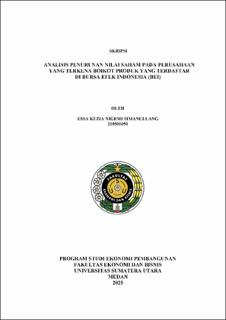| dc.contributor.advisor | Soeparno, Wahyu Sugeng Imam | |
| dc.contributor.author | Simanullang, Essa Kezia Nigemi | |
| dc.date.accessioned | 2025-10-06T06:33:59Z | |
| dc.date.available | 2025-10-06T06:33:59Z | |
| dc.date.issued | 2025 | |
| dc.identifier.uri | https://repositori.usu.ac.id/handle/123456789/108983 | |
| dc.description.abstract | One of the phenomena affecting the economy and politics in Indonesia is
the conflict between Palestine and Israel. This issue has triggered strong reactions
in various parts of the world, manifested in the form of boycotts against products
affiliated with Israel. As a predominantly Muslim country, Indonesia also supports
the boycott movement. The companies involved in the controversy experienced
significant stock trades, indicating that investors are sensitive to social and
political issues.
This study examines the impact of the product boycott movement related
to the Israel-Palestine conflict on the company's stock performance on the IDX,
aiming to determine whether there are significant changes in stock prices,
abnormal returns, trading volume activity, and volatility returns before and after
the boycott movement. This study employs a quantitative approach, focusing on 8
companies affiliated with Israel. Data collection was carried out using secondary
data sourced from the Indonesia Stock Exchange (IDX) and Yahoo Finance. This
research was analyzed using the event study method to measure the impact of the
boycott movement on stock prices, abnormal returns, and trading volume activity
of companies on the IDX, and Generalized AutoRegressive Conditional
Heteroskedasticity (GARCH) to analyze the volatility of stock returns in the 240
day period before and after the boycott movement.
The results of this study indicate that the product boycott movement
against companies listed on the IDX does not have a significant impact on stock
prices and abnormal returns, but has a significant impact on trading volume
activity, as well as causing increased volatility in some stocks such as ADES,
which indicates an investor reaction to social issues even though it does not fully
affect the value of shares. So it is recommended that investors pay attention to
socio-political factors in making investment decisions and regulators are more
responsive to market dynamics due to public sentiment. | en_US |
| dc.language.iso | id | en_US |
| dc.publisher | Universitas Sumatra Utara | en_US |
| dc.subject | Product Boycott | en_US |
| dc.subject | Stock Price | en_US |
| dc.subject | Abnormal Return | en_US |
| dc.subject | Trading Volume Activity | en_US |
| dc.subject | Volatility | en_US |
| dc.subject | Event Study | en_US |
| dc.subject | GARCH | en_US |
| dc.title | Analisis Penurunan Nilai Saham pada Perusahaan yang Terkena Boikot Produk yang Terdaftar di Bursa Efek Indonesia (BEI) | en_US |
| dc.title.alternative | Analysis of the Decline in Stock Value in Companies Affected by Product Boycotts Listed on the Indonesian Stock Exchange (BEI) | en_US |
| dc.type | Thesis | en_US |
| dc.identifier.nim | NIM210501050 | |
| dc.identifier.nidn | NIDN0105068501 | |
| dc.identifier.kodeprodi | KODEPRODI60201#Ekonomi Pembangunan | |
| dc.description.pages | 99 Pages | en_US |
| dc.description.type | Skripsi Sarjana | en_US |
| dc.subject.sdgs | SDGs 8. Decent Work And Economic Growth | en_US |


